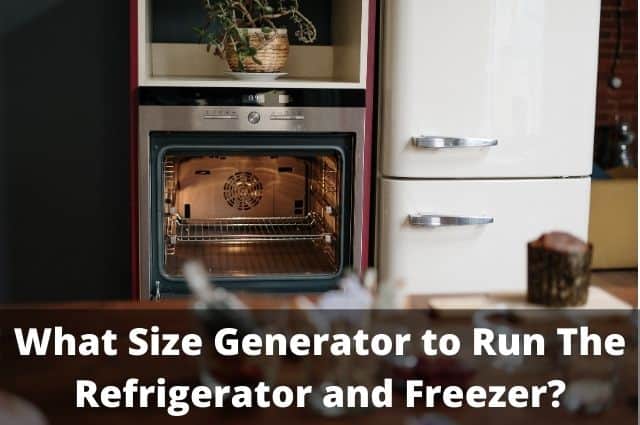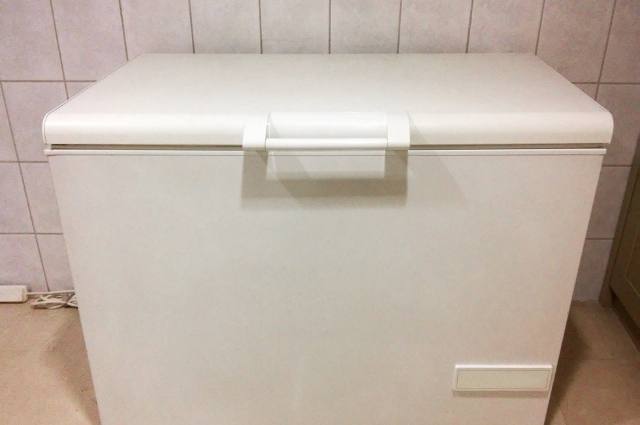The refrigerator and freezer is great invention indeed. We could keep our cooked and raw food in the refrigerator and freezer for a long time freshly.
Whether you are living in an off-grid or an urban area, you should have an alternative power source like a generator to keep running your refrigerator and freezer during a power outage.
Many of us are not conscious of the alternative power supply to our homes. They understand the crisis during the disaster. So, it would be better to take preparation for blackouts or emergencies.
Both generators and freezers are developed differently. So, the wattage comes in a different way. you will not find any single generator for all refrigerators. You should count the starter and running wattage of your refrigerator or freezer or both while buying the generator. You should buy at least a 10% more powerful generator than the starting watts of your refrigerator and freezer.
Before going in-depth, you should have a clear idea of the starting and running wattage of your electronics. Usually, the starting wattage is more than the running wattage. So, it would be better to select a generator that comes with more power supply than the starting wattage of the refrigerator or freezer.

What Is The Perfect Generator Size To Run a Refrigerator?
We use the refrigerator as a common household appliance for almost a century! Types of refrigerators have been changing. So, the wattage varies from refrigerator to refrigerator. You must know the starting and running wattage of your refrigerator first. Then you should go to the generator.
Usually, you will not find the running and starting wattage on the body of your refrigerator. Then you could check the manual. In the manual, you should find these values.
Surge wattage/ Starting wattage:
Surge or starting wattage means the power needed to start your refrigerator. It is applicable for appliances that come with an induction electric motor.
Rated wattage/Running wattage:
Rated wattage means the power needs to run the refrigerator. This term is applicable to all household electronics. Every electric appliance has an optimal running watt.
Now you are ready to go. Usually, the refrigerator needs 400 watts to 2000 watts to start. That means you need at least the equal power that is noted on the refrigerator to start.
It would be better to go for a 10% more wattage generator for your refrigerator. Like your refrigerator needs 500 watts to start. So, you should calculate this way.
500 watts+ (500*10%) = 550 watt.
What Is The Perfect Generator Size to Run a Freezer?
The calculation for the freezer is almost the same as for the refrigerator. Usually, the freezer needs more power to start than the refrigerator. The freezer needs 600 watts to 2000 watts to start. So, you need at least the equal power of the starting watt.
Like the refrigerator, you could consider 10% more watts for your refrigerator.
What Size of Generator for Both Freezer and Refrigerator?
Say you have both a freezer and a refrigerator. Then what should you do?
The answer is pretty simple. The principle is applicable to all household appliances.
For example, your refrigerator needs 700 watts and the freezer needs 1000 watts to start.
So, your total starting power is = (700 watts + 1000 watts) = 1700 watts.
As a rule of thumb, you need 10% more than the starting watts.
So, the final count is = 1700 watts + (1700*10%) = 1700+170 watts = 1870 watts.
You can apply the calculation to your household appliances. Usually, people operate not only a refrigerator or freezer but also operate other home appliances.
So, you could calculate all the wattage before buying.
How Many Watts Does a Refrigerator or Fridge Need?
Here is a general list of running and starting watts of different types of refrigerators and freezers. Please remember, this is not the constant wattage. Please, Recheck before buying a generator for your refrigerator and freezer.
| Fridge Type | Starting Watts | Running Watts | Need Inverter? |
| Old Fridge (Early 2000) | 300W -1200W | 200W-800W | Usually No |
| Modern Fridge (After 2000) | 150W-600W | 100W-400W | YES |
| Smart Fridge | 375W-750W | 250W-550W | Yes |
| Mini Fridge | 125W – 150 W | 85W – 100 W | Usually No |
| Under-Counter Refrigerator | 120W – 210W | 90 – 140W | Usually No |
| Side-by-Side Fridge | 1,190W | 790W | Yes |
| Mini Glass Refrigerator | 210W | 140W | Usually No |
| Mini Freezer | 50W – 75W | 35W – 50W | Usually No |
| Deep Freezer (Chest) | 520W – 750W | 350W – 500W | Usually No |
| Counter-Top Fridge | 240W | 160W | Usually No |

Related Question on Generator and Refrigerator
Can I Plug My Refrigerator Into a Generator?
Yes, you could plug your refrigerator into a portable generator. Only the portable generator comes with direct plug-in convenience. The starting watt of the refrigerator must be lower than the power of a portable generator.
Though you can directly plug in your refrigerator with the portable generator, you should use a transfer switch to run your home appliances during a power outage. Yes, installing a transfer switch costs you some extra bucks, but you will be secure. Moreover, installing a transfer switch is not a complicated thing at all.
How long should a generator Run a Refrigerator Cold?
According to most of the specialists, you can run your refrigerator for 4 hours by running the generator for 1 hour. But it varies from brand to brand and model to model. Read this article to learn more about the running time of a refrigerator with a generator!
Can a 1000-Watt Generator Run a Refrigerator?
A 1000-watt portable generator is not perfect for the regular refrigerator. But if you have a mini-refrigerator in your home that comes with less than 1000 watt starting power, you could run them. With a 1000-watt inverter generator, you can not run medium to large home appliances.
Can a 2000-watt generator run a refrigerator?
Yes, you can run a refrigerator with a 2000-watt generator. In this case, the starting power should be less than or equal to 2000 watts. If you are determined to run only your refrigerator with the 2000-watt portable generator, your refrigerator will run smoothly. And you can run your regular-size refrigerator with a 2000-watt portable generator.
Here, the generator type is not a fact. you can use a gasoline, diesel, or propane generator. Additionally, the refrigerator is not a sensitive device like a laptop. So, the inverter generator is not a condition here.
Will a 2200-Watt Generator Run a Fridge?
Yes, you could run almost every type of fridge with a 2200-watt fridge. Just ensure the starting power of your fridge before use. But you can not run all other home appliances like the heating unit, air conditioner, and fridge at a time with a 2200-watt generator.
Will a 3500-Watt Generator Run a Refrigerator?
A 3500-watt generator is enough to run a refrigerator. With a 3500 watt, you can not only run a refrigerator or freezer but also run other small appliances in your house.
Can a 5000-watt generator run a refrigerator and freezer?
With a 5000-watt generator, you can run small home appliances along with the refrigerator and freezer. A 5000-watt generator is perfect for a 3 or 4-bedroom house.
Will a 6500-watt generator run a refrigerator?
Yes, you can run not only the refrigerator but also the freezer and other home appliances like television, washing machine, dryer, etc. with a 6500-watt generator. A 6500-watt generator is quite powerful to run home appliances at a time like the small heating unit, air-conditioner, and refrigerator.
Final Thoughts
I hope you have understood the basic relationship between the fridge and the generator. The calculation is so easy. Don’t rely on other people. Use your common sense to buy the right size generator.
In my opinion, it would be better to buy a high-wattage generator for your house. it doesn’t matter how frequently you use the generator. But if you have the giant one, you can run a refrigerator smoothly as well as other small appliances in your home.
Also Read
Recent Posts
Yes, synthetic oil can generally be used in generators. It offers superior lubrication, improved resistance to temperature variations, and longevity compared to conventional oil, which can enhance...
In today's digital age, our dependency on computers and other electronic devices is undeniable. But what happens when a power outage occurs? This is where generators come in. However, is it safe to...
